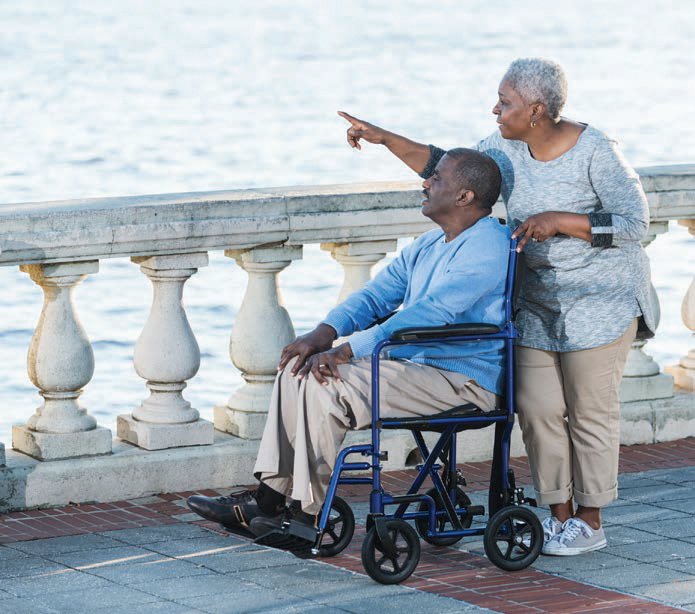
Tips for traveling with someone with dementia so you can stress less.
By Margie Monin Dombrowski
When you’re caring for someone with dementia, you want to anticipate and plan for every possible scenario, whether good or bad. You not only feel responsible for their day-to-day and overall well-being, but you can also feel overprotective—and rightly so.
But when it comes to deciding whether to take the person outside of their comfort zone and off their routine by traveling, is it worth the risk? While the answer depends on the individual, the following tips can help you plan for a successful trip with someone with dementia.
When, Why and Where You
Should Travel
Travel is typically easier when the person is in the earlier stages of dementia, although traveling with someone in the later stages isn’t impossible with the right precautions.
“It depends on the stage of the disease,” says Grace LeRoux, Assistant Director of Nursing at Bethesda Meadow, a skilled nursing home community in Ellisville, Mo. “For somebody who’s in the late stages of Alzheimer’s or dementia, the stress of the trip might be detrimental to them with the change. Earlier on I think it depends on the trip, especially if it’s a place they’ve been before, like a yearly trip to a loved one’s house for the holidays or a family vacation. Those are usually the best circumstances.”
The type of destination should be tailored to each person. While you probably want to avoid hectic and crowded settings, a relaxing vacation would be a better plan. Ideally, it’s a place the person has been before or that has sentimental value.
“I love the idea of going somewhere that was familiar before the onset of dementia,” says Dr. Nora O’Brien, executive director of Willow Towers Assisted Living and Willow Gardens Memory Care, both in New Rochelle, N.Y. “So if every year you went as a family to Cape Cod and it’s a place that holds wonderful memories for your loved one, hopefully he or she remembers. You want to keep it as familiar and simple as you can.”
Realistic Expectations
Before booking the trip, be sure you’re traveling for the right reasons. Are you taking the person along because you think it’s important? Are your expectations for the trip realistic?
“You’re going to balance the difficulties to the benefits, but if it’s important for grandma to see her granddaughter get married, you might choose to do it even if it’s a challenge,” says Dr. O’Brien. “Maybe keep her at the wedding only part of the time, then have her go stay with a caregiver back at the hotel.”
Are you taking the person along because you think it’s important?
Are your expectations for the trip realistic?
How to Plan a Stress-free Trip
While you’re away, building in comfort and consistency with the person’s routine is key to a smooth trip. Even though you’re in a new or different place, try to keep the daily itinerary simple and close to normal to keep stress and confusion at bay. Because of sundowning and the fact that most people are at their best in the morning, this is an ideal time to be out and about while on a trip.
“Keep the time they go to bed or eat meals as close to the same as possible,” says LeRoux. “Bring along special items they might like, like a blanket they sleep with, books they like to read or a TV show they watch every evening, and incorporate that into the trip to create consistency.”
Factor in the extra time (and patience) you’ll need to help your loved one throughout the trip, with getting ready in the morning, for example. You may even consider having an extra caregiver on hand for additional support, which can be another family member who can step in to help or someone you hire.
“One thing caregivers should know is to anticipate the changes in how their loved one acts,” says LeRoux. “They thrive a lot on routine. They may need help dressing or going to the bathroom. It may change when they’re out of familiar surroundings …
Expect the unexpected.”
Being prepared can make the trip easier on you and your loved one. If you’re taking a plane, choose a direct f light rather than making a connecting flight. Be sure to take the person to the bathroom before boarding a plane or leaving anywhere. Take breaks when you’re on the road and remember to enjoy each moment.
“Always allow extra time. They won’t always fit into our time schedule; we’ll have to fit into theirs,” says Dr. O’Brien.
With a proactive, positive approach, traveling with your loved one can benefit you both.
“Don’t think just because you bring her back to Cape Cod that all her deficits are going to go away. But it is nice to change the routine as long as the person can handle it,” says Dr. O’Brien. “Make sure you’re doing it for your loved one.”










